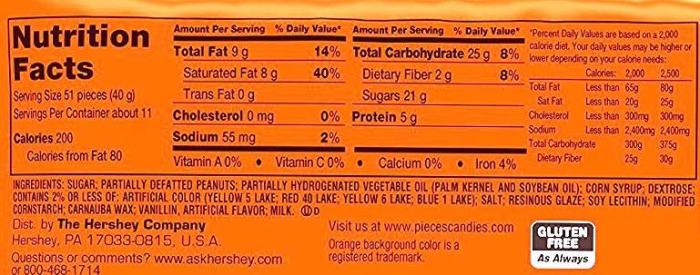Comparison to Other Protein Bars: One Reese’s Protein Bar Nutrition Facts

One reese’s protein bar nutrition facts – Reese’s Protein bars offer a unique combination of chocolate and peanut butter flavors within the protein bar market. However, understanding how their nutritional profile stacks up against competitors is crucial for consumers making informed choices. This comparison analyzes the macronutrient composition of a Reese’s Protein bar against three other popular brands, highlighting their similarities and differences.
The following table directly compares the nutritional information of a Reese’s Protein bar to three other popular protein bars with varying flavor profiles. These bars were selected to represent a range of options available to consumers, including those focused on different dietary needs and preferences. Note that nutritional values can vary slightly depending on the specific flavor and batch.
Nutritional Comparison of Protein Bars
| Protein Bar | Protein (g) | Fiber (g) | Sugar (g) | Calories |
|---|---|---|---|---|
| Reese’s Protein Bar (example values) | 20 | 2 | 10 | 250 |
| RXBAR (Peanut Butter) (example values) | 12 | 5 | 3 | 210 |
| Kind Protein Bar (Dark Chocolate Nuts & Sea Salt) (example values) | 10 | 4 | 6 | 200 |
| Quest Protein Bar (Chocolate Brownie) (example values) | 20 | 4 | 1 | 210 |
Analyzing the table reveals significant differences in macronutrient composition across the four protein bars. While both the Reese’s and Quest bars boast a high protein content (around 20g), they differ substantially in sugar content. The Reese’s bar contains significantly more sugar (10g) compared to the Quest bar (1g), reflecting the inherent sweetness of its chocolate and peanut butter flavor profile.
The RXBAR and Kind bars offer a lower protein content but higher fiber, suggesting a potentially better balance for digestive health. The RXBAR, in particular, stands out with its minimal added sugar.
Determining the “best” bar depends entirely on individual dietary goals. For individuals prioritizing high protein intake, the Reese’s and Quest bars are strong contenders. However, consumers focused on minimizing sugar intake would find the Quest bar a more suitable choice. The RXBAR and Kind bars present a more balanced approach, offering a good amount of fiber alongside moderate protein, making them potentially better options for individuals seeking a healthier balance overall.
The lower sugar content in the RXBAR and Kind bars also contributes to their potentially lower overall calorie count compared to the Reese’s bar.
One Reese’s Protein bar boasts a relatively high protein content, but its sugar levels often raise concerns among health-conscious consumers. A comparative analysis might involve looking at the nutritional profile of salty snacks; for instance, you can find detailed information on nutrition facts for salt and vinegar chips to contrast the macro-nutrient composition. Returning to the Reese’s bar, understanding its complete nutritional breakdown is crucial for informed dietary choices.
Potential Health Implications

Reese’s Protein bars, while offering a convenient protein boost and satisfying a sweet craving, present a complex picture regarding their impact on health. Their nutritional profile necessitates careful consideration within the context of a balanced diet and individual health needs. Regular consumption, while potentially beneficial in some aspects, can also pose risks depending on individual circumstances and dietary habits.The primary benefits stem from the protein content, contributing to satiety and muscle maintenance or growth.
However, the high sugar and potentially saturated fat content present significant drawbacks that must be weighed against these advantages. Understanding these potential effects is crucial for making informed choices about incorporating this product into one’s lifestyle.
Blood Sugar Impact and Overall Health
Regular consumption of Reese’s Protein bars, given their relatively high sugar content, could negatively affect blood sugar levels, particularly in individuals with insulin resistance or type 2 diabetes. The rapid rise in blood glucose following consumption can lead to energy crashes and contribute to long-term health problems. Conversely, for individuals with healthy blood sugar regulation and moderate consumption, the impact might be less pronounced.
The bar’s protein content may partially mitigate the glycemic response, slowing down the sugar absorption compared to consuming a similar amount of pure sugar. However, this mitigating effect might not be sufficient to eliminate the risk entirely. Maintaining a balanced diet and mindful consumption remains crucial. For example, a person with prediabetes might experience a significant blood sugar spike after consuming a Reese’s Protein bar, whereas a healthy individual with a balanced diet might experience a less dramatic effect.
Concerns Related to High Sugar and Saturated Fat
The significant sugar content in Reese’s Protein bars raises concerns about weight gain, increased risk of type 2 diabetes, and dental problems. High sugar intake is linked to various chronic diseases. Furthermore, the presence of saturated fat contributes to elevated cholesterol levels, increasing the risk of cardiovascular disease. While the protein content offers some nutritional benefit, it cannot fully offset the negative impact of excessive sugar and saturated fat.
The magnitude of these risks depends on the overall dietary pattern and the individual’s predisposition to these health conditions. For instance, an individual consuming a high-sugar diet might see an exacerbation of their health issues with regular consumption, while someone with a generally healthy diet might experience less severe effects.
Nutritional Content and Individual Needs, One reese’s protein bar nutrition facts
The nutritional profile of a Reese’s Protein bar necessitates careful consideration based on individual dietary needs and health conditions. For individuals following a low-sugar or low-fat diet, this bar is likely unsuitable due to its high sugar and saturated fat content. Conversely, athletes or individuals with high protein requirements might find it a convenient, albeit not necessarily optimal, source of protein, provided their overall diet remains balanced.
Pregnant or breastfeeding women should exercise particular caution due to the high sugar content. Individuals with specific health conditions, such as diabetes or heart disease, need to consult with their healthcare providers before incorporating Reese’s Protein bars into their diet. For example, a bodybuilder on a strict high-protein diet might find the bar a helpful supplement, while someone with heart disease should likely avoid it due to the saturated fat.
FAQ Summary
What are the potential long-term effects of regularly consuming Reese’s Protein Bars?
Regular consumption of high-sugar, high-fat foods like Reese’s Protein Bars, even if they contain protein, may contribute to weight gain, increased risk of type 2 diabetes, and other health issues. Moderation is key.
Are Reese’s Protein Bars suitable for individuals with specific dietary restrictions (e.g., gluten-free, dairy-free)?
Always check the ingredient list for allergens. Reese’s Protein Bars may contain allergens depending on the specific formulation. Consult the manufacturer’s information for details on specific dietary restrictions.
How does the protein content in a Reese’s Protein Bar compare to other protein sources?
The protein content will vary depending on the bar’s size and formulation. Compare the grams of protein per serving to other protein sources like lean meats, poultry, fish, beans, or lentils to assess its relative contribution to your daily protein intake.
